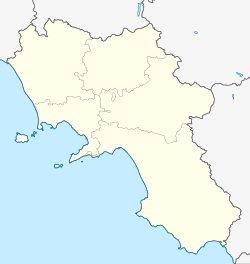
Back Salerno ALS Salerno AN سلرنو Arabic ساليرنو ARZ Salerno AST Salerno Azerbaijani سالرنو AZB Салерна Byelorussian Салерна BE-X-OLD Салерно Bulgarian
You can help expand this article with text translated from the corresponding article in Italian. (October 2023) Click [show] for important translation instructions.
|
Salerno
Salierno (Neapolitan) | |
|---|---|
| Comune di Salerno | |
 Panorama of Salerno | |
 Salerno within the Province of Salerno and Campania | |
| Coordinates: 40°40′50″N 14°45′34″E / 40.68056°N 14.75944°E | |
| Country | Italy |
| Region | Campania |
| Province | Salerno (SA) |
| Founded | 197 BC |
| Government | |
| • Mayor | Vincenzo Napoli (PD) |
| Area | |
• Total | 58.96 km2 (22.76 sq mi) |
| Elevation | 4 m (13 ft) |
| Population (30 November 2014)[2] | |
• Total | 133,199 |
| • Density | 2,300/km2 (5,900/sq mi) |
| Demonym | Salernitano |
| Time zone | UTC+1 (CET) |
| • Summer (DST) | UTC+2 (CEST) |
| Postal code | 84121–84135 |
| Dialing code | 089 |
| Patron saint | Saint Matthew |
| Website | Official website |
Salerno (UK: /sæˈlɛərnoʊ/,[3] US: /səˈ-, sɑːˈ-, səˈlɜːrnoʊ/;[4][5][6] Italian: [saˈlɛrno] ; Neapolitan: Salierno [saˈljernə]) is an ancient city and comune (municipality) in Campania, southwestern Italy, and is the capital of the namesake province, being the second largest city in the region by number of inhabitants, after Naples.[7] It is located on the Gulf of Salerno on the Tyrrhenian Sea. In recent history the city hosted Victor Emmanuel III, the King of Italy, who moved from Rome in 1943 after Italy negotiated a peace with the Allies in World War II, making Salerno the capital of the "Government of the South" (Regno del Sud) and therefore provisional government seat for six months. Some of the Allied landings during Operation Avalanche (the invasion of Italy) occurred near Salerno.
Human settlement at Salerno has a rich and vibrant past, dating back to pre-historic times. In the early Middle Ages it was an independent Lombard principality, the Principality of Salerno, which around the 11th century comprised most of Southern Italy. During this time, the Schola Medica Salernitana, the first medical school in the world, was founded. The Normans in 1077 made Salerno the capital of their rule in all continental southern Italy. In the 16th century, under the Sanseverino family, among the most powerful feudal lords in southern Italy, the city became a great centre of learning, culture and the arts, and the family hired several of the greatest intellectuals of the time.[8] Later, in 1694, the city was struck by several catastrophic earthquakes and plagues.[8] During a period of Spanish rule the city suffered a crisis which would last until the 18th century, but under Napoleon Salerno became part of the Parthenopean Republic.[8] In the 19th century Salerno supported ideas of the Risorgimento and welcomed Garibaldi in 1861.
The city is divided into three distinct zones: the medieval sector, the 19th century sector and the more densely populated post-war area, with its several apartment blocks.[8] A patron saint of Salerno is Saint Matthew, the Apostle, whose relics are kept here at the crypt of Salerno Cathedral.
- ^ "Superficie di Comuni Province e Regioni italiane al 9 ottobre 2011". Italian National Institute of Statistics. Retrieved 16 March 2019.
- ^ "Bilancio demografico Anno 2014 (dati provvisori) Comune: Salerno" (in Italian). ISTAT. 2014. Archived from the original on 26 October 2014. Retrieved 1 April 2015.
- ^ "Salerno". Lexico UK English Dictionary. Oxford University Press. Archived from the original on 22 March 2020.
- ^ "Salerno". The American Heritage Dictionary of the English Language (5th ed.). HarperCollins. Retrieved 12 May 2019.
- ^ "Salerno". Collins English Dictionary. HarperCollins. Archived from the original on 12 May 2019. Retrieved 12 May 2019.
- ^ "Salerno". Merriam-Webster.com Dictionary. Merriam-Webster. Retrieved 12 May 2019.
- ^ "Bilancio demografico mensile". demo.istat.it. Archived from the original on 29 October 2022. Retrieved 21 December 2022.
- ^ a b c d "Salerno – History, art and culture". Archived from the original on 21 August 2007.




